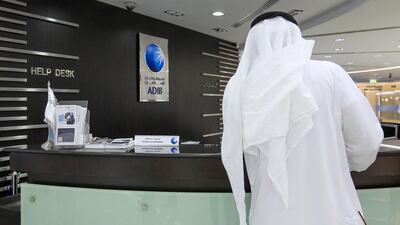The opportunity to benefit from growth in the booming smartphone market would seem an attractive investment for many.
Throw in the safety net of a complete refund if the market unexpectedly sours and the deal becomes even more enticing.
That’s the proposition Abu Dhabi Islamic Bank (ADIB) is offering its customers investing in a new so-called capital-protected note it launched last month.
Maturing in 18 months, the product offers “the opportunity to profit from the anticipated growth of smartphone manufacturers including Apple, Lenovo Group, LG Electronics and Samsung Electronics”, according to an ADIB release. The 100 per cent capital protection offered by the note means investors get their money back if the smartphone market unexpectedly takes a turn for the worse. Still, ADIB says the expected return is 8.47 per cent.
“The rapid increase in demand for wireless data is driving demand for smartphones and tablets,” says Daffer Luqman, global head of liabilities and wealth management at ADIB. “Global smartphone sales surpassed 1 billion units for the first time in 2013 and are forecasted to rise around 20 per cent this year, according to Consultants International Data Corporation.”
Aimed at retail customers, the note is the latest of about 15 the bank has launched.
Capital-protected notes are becoming more popular in the Middle East after establishing themselves as a common feature of the western investment landscape since the late 1990s. “Immune from the bear and amiable to the bull” was the unofficial motto they garnered in the US. Downside risk was safeguarded through insurance contracts and upside potential was possible by linking the investment to a market index, so the sales mantra went.
But for all their supposed advantages, investors are also being warned to be cautious before snapping them up. Scratch below the surface and such products often come attached with strings not immediately obvious from the glossy marketing brochures.
“Such products have a place in financial planning and portfolio structure, but are often sold by salespeople who don’t really understand them,” says Keren Bobker, a senior consultant at the wealth management company Holborn Assets and the On Your Side columnist for The National. “It is essential to read the small print and understand the level of protection that is actually being provided, as this varies.”
The investment structure of the notes tends to be complex and rigid. When an individual directly buys a stock they will know how their investment is faring based on the performance of the market. They can then usually choose to keep their money invested or sell it, depending on whether the market is moving up or down. But with a capital-protected note, the return is less clear-cut, being normally linked to a specific index or basket of shares, “some of which can be rather limited or obscure, usually increasing the risk”, says Ms Bobker.
ADIB says its note was “not directly invested in the equities but is used as an underlying asset of the option that the bank buys – this is what allows ADIB to provide the capital protection.”
Another important point to check before signing up for such a product is the fee involved and whether the seller is investing it directly or using a third-party provider.
ADIB says the only fee involved in its product is the “one-time upfront fee which is charged for managing, administering and providing protection for capital for customers.” Those fees change “depending on the product they are being applied to”, it adds.
Asked whether ADIB invested the note directly or used a third-party provider, the bank says: “We use a third party for the option part only. There are very few financial institutions that can provide Sharia-compliant options of this kind.”
Fans of the products point to one key benefit: the pledge of a high amount of the original capital invested back – often as much as 100 per cent – at the product’s maturity.
They also point out that they are usually focused on asset classes with healthy potential returns. Back in 2008, Dubai Islamic Bank launched a five-year Sharia-compliant capital protected note which would invest assets in equities and equity-related securities linked to the water industry, agribusiness and alternative energy. The note was benchmarked to the performance of the DWS Invest New Resources Fund, a Luxembourg-domiciled fund with 40 per cent of assets invested in the US and, according to Bloomberg data, the fund has delivered returns of 8.52 per cent over the past five years.
ADIB’s Mr Luqman says the bank’s capital-protected notes had been “well received by investors and provided them with a good return on their capital”.
A gold note that matured last year produced a total return of 15 per cent. Two slightly lower risk notes returned 6 per cent and 4 per cent.
“Returns vary as per the underlying assets, the level of protection, the duration of investment, the payout structure and the volatility of the market,” says Mr Luqman.
But there are other potential pitfalls for investors. Although most products may promise the investor receives his or her money back at maturity, very few will adjust the return to keep pace with inflation. Therefore if markets fall and the investor gets only their original capital back, they will have lost money in real terms as the capital’s value will have been eroded by inflation.
There are also other more extreme risks. A month before Lehman Brothers’ bankruptcy in September 2008 it was selling notes pegged to gains in the Standard & Poor’s 500 Index offering “100 per cent principal protection.” However, one of the clauses in the investment was that it was “subject to the credit risk of Lehman Brothers”, according to the brochure marketing the product. Lehman’s collapse left holders of the notes unsure if they would get their money back.
tarnold@thenational.ae

